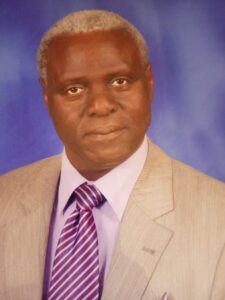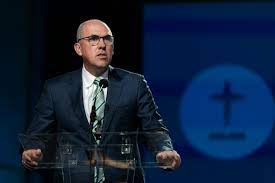“Paul, Silas, and Timothy, To the church of the Thessalonians in God the Father and the Lord Jesus Christ: Grace and peace to you. 2 We always thank God for all of you and continually mention you in our prayers. 3 We remember before our God and Father your work produced by faith, your labour prompted by love, and your endurance inspired by hope in our Lord Jesus Christ”. 1 Thessalonians 1:1-3
This was the first epistle that Paul wrote to European Christians, and in it, the fundamental things of the Christian life are very clearly set forth. In this passage, we see his greeting and thanksgiving to God for their faith. Thus, the apostle greets the Thessalonian Christians collectivizing his greetings with those of Silas, and Timothy. The epistle is addressed to the church of the Thessalonians in God the Father and the Lord Jesus Christ to whom he says: “Grace to you and peace from God our Father and the Lord Jesus Christ.”
The collectivized greeting of Paul, Silas, and Timothy shows that Paul was an amazing man and apostle of God, but he usually did not work all by himself. Whenever he could, Paul worked with a team. Here Paul mentioned the men he worked with. Silas, also known as Silvanus was a long and experienced companion of Paul. He traveled with Paul on his second missionary journey and was imprisoned and set free with Paul in the Philippian jail (Acts 16:19-30). When Paul first came to Thessalonica, Silas came with him (Acts 17:1-9). Therefore, the Thessalonians knew him well.
Timothy was a resident of Lystra, a city in the province of Galatia (Acts 16:1-3). He was the son of a Greek father (Acts 16:1) and a Jewish mother named Eunice (2 Timothy 1:5). From his youth learned the Scriptures from his mother and grandmother (2 Timothy 1:5; 3:15). Timothy was a trusted companion and associate of Paul, and he accompanied Paul on many of his missionary journeys. Paul sent Timothy to the Thessalonians on a previous occasion (1 Thessalonians 3:2). Therefore, this epistle is to the church of the Thessalonians. We should note that Paul himself founded the church in Thessalonica on his second missionary journey (Acts 17:1-9). He was only in the city for a short time because he was forced out by enemies of the Gospel. Yet the church of the Thessalonians continued alive and active. Though Paul had to suddenly leave this young church, his deep concern for them prompted this epistle.
On Paul’s second missionary journey, he was imprisoned in Philippi and then miraculously freed from jail only to be kicked out of the city. Then he came to Thessalonica, the prosperous capital of the province of Macedonia in northern Greece that was located on the famous Egnatian Way. Therefore, to them, he says: “Grace to you and peace from God our Father and the Lord Jesus Christ.” We should note that Paul brought this customary greeting to the Thessalonian Christians, hailing them in the grace and peace of God the Father. Here, we notice a big step from ‘greeting’ to ‘grace.’ Grace fundamentally means ‘that which causes joy,’ a shade of meaning we may still discern when we speak of a graceful action or social graces. It comes to mean ‘favour,’ ‘kindness,’ and then especially God’s kindness to man in providing for his spiritual needs in Christ.
His reference to God our Father and the Lord Jesus Christ is fundamental in the sense that Paul’s construction, unites the two under the government of the one preposition in (en), thereby placing the two names side by side on a basis of equality. It is a clear witness to his conviction concerning the deity of Jesus Christ.
It is important to notice that the first words of 1 Thessalonians are in the form usual at the beginning of a letter of this period. What follows is a real letter arising out of the situation in which the apostle and his friends find themselves.
Here in this passage, we see Paul’s gratitude to God when he says: “We give thanks to God always for you all, making mention of you in our prayers.” When Paul thought of the Christians in Thessalonica, his heart was filled with gratitude given that he started the church there in less than ideal circumstances. This was in the sense that it was run out of town after only three weekends with them (Acts 17:1-10). Despite this, the church was strong and full of life. Thus, Paul knew that this work was beyond him and his abilities and that it was the work of God.
The regularly recurring nature of the thanksgiving is also implied in the use of the present tense of the verb. It is their practice to give thanks to God ‘continually, never skipping a single day. He acknowledges making mention of them in their prayers. This reveals that when Paul prayed for people and churches, it was not necessarily a long time of intercession. He often simply made mention of a church or a person in prayer as we see in Romans 1:9, Ephesians 1:16 and Philemon 1:4.
The collectivized greeting was significant in the sense that Paul was not alone. The plural implies that all three missionaries prayed together. We can, therefore, tell why Paul gave thanks to God for the Thessalonian Christians. He commented them for their work of faith, labour of love, and patience of hope in our Lord Jesus Christ in the sight of God our Father, knowing, their election by God.
He attests to their remembering without ceasing their work of faith. We should note that there were things about the Christians in Thessalonica that Paul simply could not forget. He always remembered them, and what he remembered about them, made him thankful.
However, Paul’s gratitude did not come because all the Christians in Thessalonica thought so highly of him. Later, Paul used a whole chapter defending himself and his ministry against slander and false accusations. Thus, Paul’s gratitude did not come because the Thessalonian believers in Christ were morally impeccable. Later in the epistle, he strongly warned them against the failings in regard to sexual impurity.
Paul’s gratitude did not come because the Thessalonian Christians were completely accurate in all their doctrine. He had to correct some of their wrong ideas in that area also. He speaks of “Your work of faith, labour of love, and patience of hope in our Lord Jesus Christ”. This shows us that despite the problems, Paul was so grateful to God for the Thessalonians because there was an undeniable work of the Holy Spirit and a marvelous change in their lives. The three great Christian virtues of faith, love and hope were evident among them.
Verse 1 says: “Paul, Silas and Timothy, To the church of the Thessalonians in God the Father and the Lord Jesus Christ: Grace and peace to you.” Here for the first time, chronologically, in Paul’s writings we have this famous triad of faith, love, hope. But Paul’s stress is not on these virtues alone, but rather upon what they produce in believers. Most importantly, their faith produced work, as is the nature of true faith. Their love produced labour. There are two different ancient Greek words for work namely “ergon” and “kopos”. “Ergon” was associated with that which is pleasant and stimulating, but “kopos” implied toil that is strenuous and sweat-producing.
Their hope produced patience, which was the long-suffering endurance needed to not only survive hard times, but to triumph through them.
The greetings from Paul, Silas, and Timothy, was a greeting from the same three names of people who constitute an effective and powerful team. Paul, a leader, scholar, and writer was determined to spread the gospel throughout the Roman world. Silas, a Hellenistic Jew, held a prominent part in the Council at Jerusalem. The Council asked him to accompany Paul and Barnabas to Antioch to strengthen the church there. He also joined Paul on his second missionary expedition. He facilitated both Paul and Peter in the writing and delivery of their epistles.
Timothy was an effective assistant of the apostle Paul and also Paul’s son in the faith. His father was a Gentile, and his mother, a Jew. Timothy was a pastor and therefore, a troubleshooter for Paul.
He was writing to the church of the Thessalonians and we should note that churches in the New Testament often named their churches based on the city or province where they were located (1 Corinthians 16:1, 2 Corinthians 8:1 and Galatians 1:22). Evidently, the apostle Paul maintained care for the Thessalonians. He did not “love them and leave them.” People that we influence for the Lord require our maintenance given that everyone goes through development aches and pains. We should know that perfection is progressive, not instant.
He described as being in God our Father and the Lord Jesus Christ. Indeed, the church at Thessalonica was in God our Father and the Lord Jesus Christ. Thus, the church had its origin in a source, the Father and the Lord Jesus Christ. The reason that church existed was due to the ministry of the Father and the Son. The Father had a mission for the Son. The Son fulfilled that mission. The church at Thessalonica was a result. We should note that God has a plan for every church. The principle here is that our church is not ours but God’s.
Your church belongs to God, the Father, and the Lord Jesus Christ. As such, we are under divine surveillance.
We must, therefore, remember that our church is not ours. When tempted to cause a problem in our church, we need to keep in mind that God keeps surveillance on it. We must keep that in mind when we want to give someone a piece of our mind, as many of us would say. As was customary in the first century, Paul identifies himself at the beginning of his epistle. At one time Paul had tried to destroy Christianity, but the Lord converted him on the road to Damascus and commissioned him to be an apostle to the Gentiles (Acts 9:1-19 and Galatians 1:11-23). His faithfulness to that commission had taken him to Thessalonica, where he preached the gospel and a number of people believed. Silas and Timothy were with Paul when he preached in Thessalonica and were with him as he wrote 1 Thessalonians.
Paul addresses his epistle to the church of the Thessalonians, believers who were joined by faith to God the Father and the Lord Jesus Christ. The term “Lord” indicates that Jesus is as much God as the Father is. The name “Jesus” is from the Greek version of the Hebrew name Joshua, meaning “God is salvation”. The title “Christ” translates the Old Testament term, “Messiah.” Meaning the “Anointed One”. Thus, Paul greets the Thessalonian church with a combination of Greek and Hebrew salutations. “Grace” conveys a sense of God’s favour, and “peace” conveys a sense of well-being. We should understand that well-being results from God’s grace at work in a person’s heart.
Verse 2 says: “We always thank God for all of you and continually mention you in our prayers”.
The Thessalonians’ response to the Gospel of Christ and their continuance in the faith caused Paul and his companions to thank God for them continually. In this instance, “continually” is a hyperbole meaning very often. Obviously Paul did not mean that he spent all his time praying for the Thessalonians. Three characteristics of these Christians stood out to Paul. First, they had turned to Christ in faith. Second, they had served Him out of love. Third, they had borne up under tribulation patiently because of the hope that lay before them. Therefore, each virtue found its object in Jesus Christ as they lived before God. They had exercised faith in the past when they first trusted Christ. They were loving Him in the present, and they were hoping for His return in the future.
These three Christian virtues of faith, love, and hope occupied a large place in early analyses of Christian responsibility. The expectation was that in every life faith would work (Galatians 5:6 and James 2:18), love would labour (Revelation 2:2 and Revelation 2:4), and hope would endure (Romans 5:2-4 and Romans 8:24-25). This threefold balance probably arose even before Paul’s doctrinal stance had matured and perhaps came from the teachings of Christ himself. We should realize that the triad of faith, hope and love is the quintessence of the God-given life in Christ. In this verse Paul assures his readers that he, Silas and Timothy were praying for them. They were praying for all the Thessalonian Christians with thanksgiving as they mentioned them constantly in their prayers. These believers were a source of joy to Paul and his team members. In 1 Thessalonians 2:19-20 he asks: “For what is our hope or joy or crown of boasting before our Lord Jesus at his coming?” He answers his question by citing the Thessalonian believers: “Is it not you? For you are our glory and joy”. The apostle John, too, was filled with joy upon hearing that believers, whom he called “his children,” were “walking in the truth” (3 John 1:4).
As we can see, Paul’s New Testament epistles reveal that he prayed for believers consistently, with thanksgiving. He specifically asked God to empower them to know and do His will. Paul thanked God for the Corinthians because they had received the grace of God (1 Corinthians 1:4). He gave thanks constantly for the Ephesians because of their faith and love for all their fellow Christians (Ephesians 1:15-16). He gave thanks for the Philippians because of their ongoing partnership in the gospel (Philippians 1:3-5). We also see that he gave thanks for the Colossians because of their faith and love for all their fellow believers (Colossians 1:3-4).
Verse 3 says: “We remember before our God and Father your work produced by faith, your labour prompted by love, and your endurance inspired by hope in our Lord Jesus Christ.”
Believers at Thessalonica had three features. These distinctive enabled them to have the greatest impact of any church in the New Testament and were the source of their spiritual vitality. The apostle Paul remembered them without ceasing. The word “remembering” means to call to mind. Paul called to mind the circumstance for giving thanks. We too need to kindle our memory so that we do not neglect prayer. Here Paul and his team remember three outstanding spiritual virtues of the Thessalonians.
The character and convictions of the Thessalonians brought them regularly to the minds of Paul’s team when they went to prayer. The entire chapter is born out of the memory of a dynamic church. This is a church that manifested work, labour, and patience motivated by faith, love, and hope. The principle here is that true ministry comes from spiritual qualities.
Faith, love, and hope are fruits of the Spirit. We should know that it is possible to do God’s work in carnality. However, beloved, to work, labour, and exercise perseverance without God’s power is empty human mechanics. The church at Ephesus manifested work, labour, and perseverance but still received a rebuke from the Lord when He stated: “I know your works, your labour, your patience, and that you cannot bear those who are evil. And you have tested those who say they are apostles and are not, and have found them liars; and you have persevered and have patience, and have laboured for My name’s sake and have not become weary. Nevertheless I have this against you, that you have left your first love. Remember therefore from where you have fallen; repent and do the first works, or else I will come to you quickly and remove your lampstand from its place, unless you repent” (Revelation 2:2-5).
If we operate under the power of the Holy Spirit, we will do God’s work in God’s power. As the root, so the fruit. If we do what we do in the power of the Holy Spirit, we will produce like fruit. The apostle Paul prayed often for the saints in Thessalonica and gave joyful thanks as he recalled unceasingly the godly characteristics they displayed that so honoured the Lord. He thanked God for their work which was energised by faith, their service which was motivated by love, and their unwavering hope in the return of the Lord Jesus Christ.
As evidenced in this epistle, Paul constantly kept this little community of maturing Christians in his heart and it was with deep affection that he remembered the three spiritual gifts and graces that were manifested in their lives. The apostle knew these spiritual qualities can only be exhibited in a life that is persevering in the faith, walking in spirit and truth, and working the works of God through the sufficient grace and supernatural power which He supplies. Paul remembered the Thessalonian believers as he prayed to God the Father. Jesus taught us to address God as “Father” (Luke 11:2). The name “Father” reflects God’s love and care, and encourages us to trust Him. Paul remembered three supreme qualities his readers exhibited. The Christians at Thessalonica demonstrated faith that worked. This faith had resulted in repentance and their love for Jesus had caused them to toil for Him. We should note that it was their hope in Christ’s return that had produced in them a steadfast endurance of persecution.

Senior Pastor,
Divine Grace Ecclesia,
King’eero, Lower Kabete.







